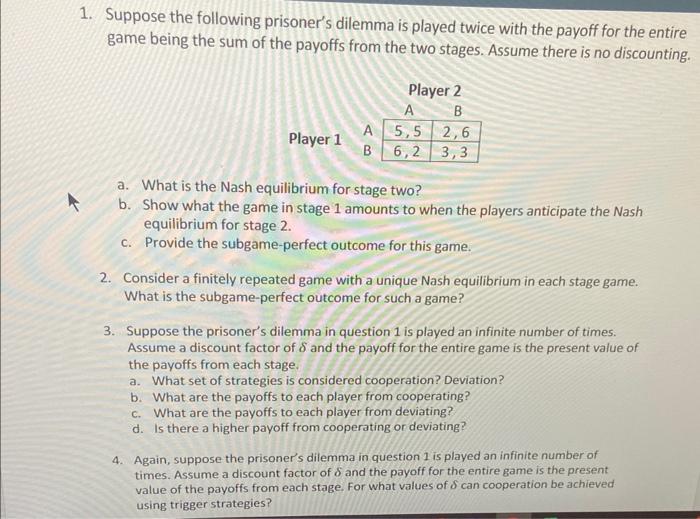Suppose the following prisoner's dilemma is played twice with the payoff for the entire game being the sum of the payoffs from the two stages. Assume there is no discounting. a. What is the Nash equilibrium for stage two? b. Show what the game in stage 1 amounts to when the players anticipate the Nash equilibrium for stage 2 . c. Provide the subgame-perfect outcome for this game. 2. Consider a finitely repeated game with a unique Nash equilibrium in each stage game. What is the subgame-perfect outcome for such a game? 3. Suppose the prisoner's dilemma in question 1 is played an infinite number of times. Assume a discount factor of and the payoff for the entire game is the present value of the payoffs from each stage. a. What set of strategies is considered cooperation? Deviation? b. What are the payoffs to each player from cooperating? c. What are the payoffs to each player from deviating? d. Is there a higher payoff from cooperating or deviating? 4. Again, suppose the prisoner's dilemma in question 1 is played an infinite number of times. Assume a discount factor of and the payoff for the entire game is the present value of the payoffs from each stage. For what values of can cooperation be achieved using trigger strategies? Suppose the following prisoner's dilemma is played twice with the payoff for the entire game being the sum of the payoffs from the two stages. Assume there is no discounting. a. What is the Nash equilibrium for stage two? b. Show what the game in stage 1 amounts to when the players anticipate the Nash equilibrium for stage 2 . c. Provide the subgame-perfect outcome for this game. 2. Consider a finitely repeated game with a unique Nash equilibrium in each stage game. What is the subgame-perfect outcome for such a game? 3. Suppose the prisoner's dilemma in question 1 is played an infinite number of times. Assume a discount factor of and the payoff for the entire game is the present value of the payoffs from each stage. a. What set of strategies is considered cooperation? Deviation? b. What are the payoffs to each player from cooperating? c. What are the payoffs to each player from deviating? d. Is there a higher payoff from cooperating or deviating? 4. Again, suppose the prisoner's dilemma in question 1 is played an infinite number of times. Assume a discount factor of and the payoff for the entire game is the present value of the payoffs from each stage. For what values of can cooperation be achieved using trigger strategies







